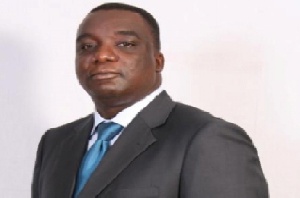- Home - News
- TWI News | TV
- Polls
- Year In Review
- News Archive
- Crime & Punishment
- Politics
- Regional
- Editorial
- Health
- Ghanaians Abroad
- Tabloid
- Africa
- Religion
- Election 2020
- Coronavirus
- News Videos | TV
- Photo Archives
- News Headlines
- Press Release
Business News of Tuesday, 11 October 2016
Source: B&FT
Banks are weak - StanChart boss
The country’s financial sector remains relatively weak and elementary after more than a century of financial services provision, Kweku Bedu-Addo, Chief Executive Officer of the Standard Chartered Bank has said.
There are about 32 universal banks in the country, more than 30 Savings and Loan companies and close to 500 micro-finance institution in the country.
Despite these numbers, the sector remains largely shallow, with GH¢120million minimum capital requirement for commercial banks deemed insufficient for them to undertake big-ticket transactions.
The Bank of Ghana is presently pondering an increment in the capital requirement, seen by some as a subtle attempt to engineer mergers.
“Ghana’s financial sector arguably remains fairly rudimentary after 120 years despite some positive strides made over the years. However, by global standards the level of capitalization of the banking sector in Ghana is relatively weak, and the market liquidity and development is also shallow.
“In effect, there has been at least three periods of austere economic policies over the last four decades which sometimes makes one asks the question: whether the institutional arrangements are robust enough to keep Ghana on a sustained path of growth, investment and reduced inequality,” Mr. Bedu-Addo said.
He raised these concerns at a public lecture organised by Standard Chartered Bank in Accra to commemorate the Bank’s 120 years’ anniversary.
Facilities for large infrastructure projects have had to be sourced from other well-established banks elsewhere on the continent or in Europe.
According to Mr. Bedu-Addo, there is a mismatch between policy intentions and real sector outcomes which needs to be addressed saying: “The reality is a bit more nuanced with complexity that is not immediately visible to the casual observer. You would agree with me ladies and gentlemen that policy comes before investments, and so if investments levels are suboptimal, then perhaps policy requires further scrutiny.”
While some Small and Medium Scale Enterprises (SMEs) have criticized banks for being risk-averse and only interested is government securities, the commercial banks on the other hand think otherwise.
“Banks often take a disproportionate amount of blame for any perceived reluctance or inertia to provide access especially to small businesses and individuals, or for prohibitive interest rates when they eventually make credit available.
Is it that the banks are simply insensitive, or blind to the investment deficit into productive and economic value-adding activities within the economy and their obvious benefit to society? I say this is not the case,” he added.
The lecture, held under the theme: “120 years of Commercial Banking in Ghana: What next?” sought to share thoughts and perspectives on various programmes implemented to develop the nation’s financial sector and more significantly, the banking industry.
Being the oldest and first commercial bank in Ghana, and having served as the Central Bank until 1953, Standard Chartered Bank has been at the forefront of banking and economic evolution in Ghana, hence the decision for such a forum to reflect on the moments.











